SLO County farms are growing ‘gorgeous’ exotic mushrooms. What’s fueling fungi craze?
Mushrooms are having a moment.
Featured in the popular Netflix documentary “Fantastic Fungi” and the HBO show “The Last of Us,” fungi have been experiencing a pop culture boost in recent months. Vogue and Salon headlined fungi couture on the fashion runways and British GQ called the phenomenon the “great ‘shroom boom.”
Some San Luis Obispo County farmers, chefs and shop owners hope to capitalize on that craze.
Joe Vergara, co-owner of Soto’s True Earth Market in Cambria, buys from several SLO County growers, including Jennifer Perryman’s Mushrooms on Main in Cambria.
“Buying produce that Jenn literally picked that morning is the ideal, and not only from a nutrient standpoint,” Vergara said. “The fresher the product is when it comes in, the better it looks, the more people will buy it, and the more often it can come in fresh.
“Customers see beautiful-looking produce they may have never tried before,” he added. “When something exotic looking looks so fresh, it encourages people to experiment and cook more.”
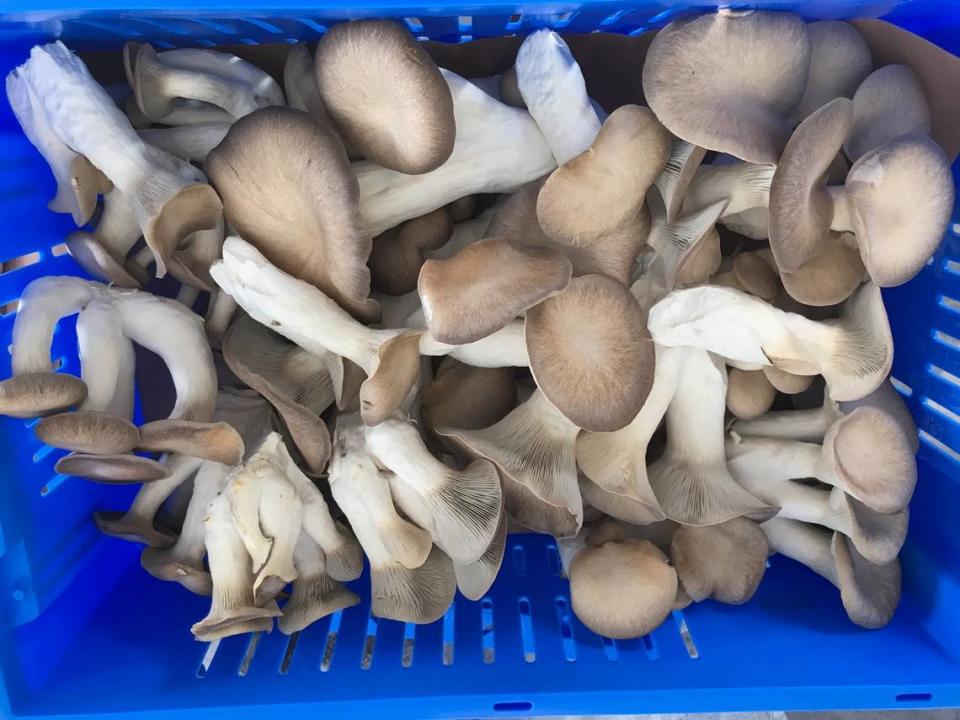
Mushrooms have been grown commercially around the world for centuries. In ancient Egypt, for instance, they were considered “a delicacy reserved only for Egyptian nobility due to their distinct flavour,” according to Science Direct.
Button, crimini and portobello mushrooms are most common in the United States, but some supermarkets have started stocking specialty varieties, especially shiitake, enoki and oyster mushrooms.
Beyond the typically earthy, umami flavors of button mushrooms, specialty mushrooms are often described as evoking the tastes of meat, fish and seafood, even crab cakes and bacon.
SLO County’s mushroom growing enterprises range from cottage-style operations that sell their fungi at farmers markets to a larger operation that caters to local restaurants and retailers.
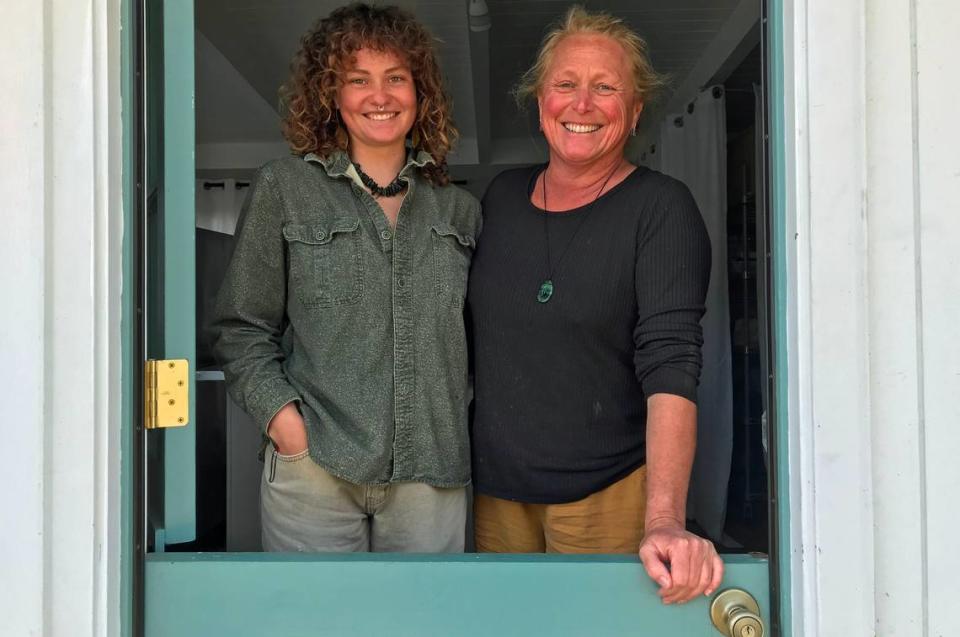
Mushrooms on Main, Cambria
Perryman, who owns Mushrooms on Main, first got interested in mushrooms when she met Rosa Zunino of Morro Bay Mushrooms at the Cambria farmers market.
“She had a table of beautiful yellow, pink and blue-grey mushroom bouquets,” Perryman recalled. “I was mesmerized and asked her how she got started growing.”
Zunino became one of Perryman’s mentors.
“I will always be grateful for her time and expertise,” Perryman said, “and have the utmost respect for what she has achieved and continues to grow.
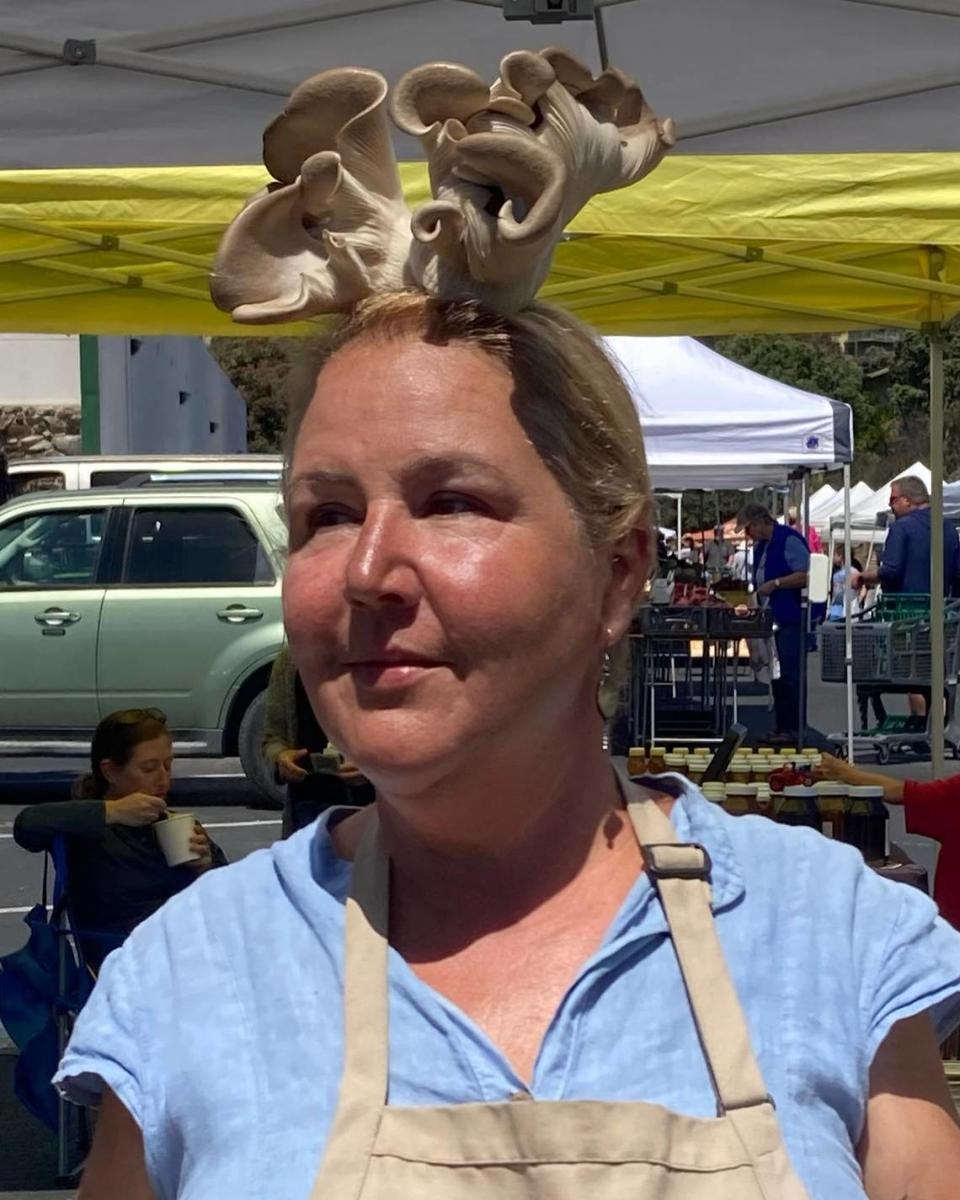
After conducting in-depth research on fungi, mycelium and how to run a multi-faceted business, Perryman launched Mushrooms on Main about a year ago, selling products wholesale to Soto’s True Earth Market and other retailers, plus restaurants including Robin’s Restaurant and Madeline’s Restaurant and Wine Cellar.
“We love using fresh local produce to create our food at Robin’s, as much as we can,” Shanny Covey, owner of Robin’s Restaurant, wrote via text. “It’s a tremendous privilege to have Jenn growing gorgeous mushrooms in our back yard, so to speak. It doesn’t get any fresher than this, and her mushrooms are top notch.”
Mushrooms on Main’s mushrooms are included on Robin’s spring menus in such dishes as fritto misto appetizer and the New York steak dinner.
David Stoothoff, who owns Madeline’s Restaurant and Wine Cellar, also praised Mushrooms on Main.
“I try to get as much local produce as possible,” the chef said in a text. “I love having Jenn growing and delivering mushrooms several times a week! It has inspired me to figure out new ways to use them and made my menu more exciting.”
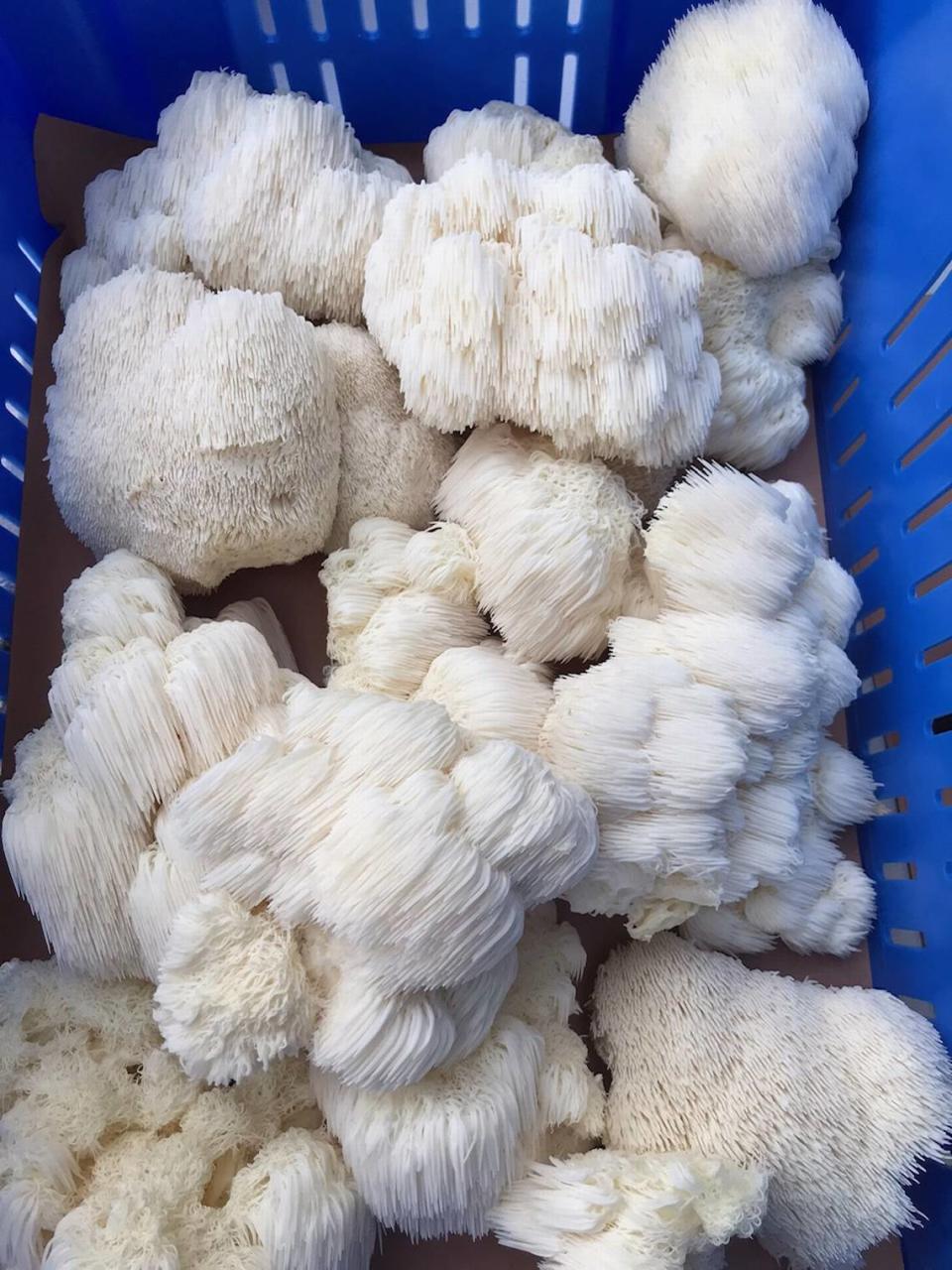
Perryman’s mushrooms are highlighted on Stoothoff’s current menus in a creamy, herbed, white-wine reduction, served over puff pastry as an appetizer or with baguette toasts as an entrée. They’re also occasionally the main ingredient on one of Madeline’s luncheon flatbreads of the day.
Among the current crops at Mushrooms on Main are king trumpet, lion’s mane and chestnut fungi.
“I’ve always had an affinity for mushrooms,” Perryman said. “The variety of types, shapes and flavors yield endless possibilities for creative cooking.”
Perryman and Mushrooms on Main assistant mycologist Lily Smith plan to start selling directly to consumers at a shop at 704 Main St. in Cambria, but they haven’t yet set the opening date.
They also plan to sell spices plus organic and vegan foods prepared in a commercially licensed kitchen by chef Monika Knapp of Colony Culture in Atascadero.

Mighty Cap Mushrooms, Paso Robles
In 2018, Chris Batlle and his family vowed to eat healthier. For them, that meant eating more mushrooms and other vitamin-rich foods.
His wife, Summer Batlle, believed the fungi could help her fight and beat cancer. She’s now cancer-free.
Science is still evolving in regards to the health-boosting advantages of eating mushrooms, but established medical sources such as the National Institute of Health say fungi’s benefits are evident.
“Together with a long history as food source, mushrooms are important for their healing capacities and properties in traditional medicine,” the NIH said in its report on mushrooms.
Mushrooms’ “nutraceutical properties” can be used to prevent or treat Parkinson’s disease, Alzheimer’s disease, hypertension and high risk of stroke, according to the report.
“They are also utilized to reduce the likelihood of cancer invasion and metastasis due to antitumoral attributes,” the report said, and can “act as antibacterial, immune system enhancer and cholesterol lowering agents.”
Using mushrooms for medicinal benefits is an individual choice, Chris Batlle said by phone. “Each person has to do their own research, consult with their doctors and make their own decisions about the medical benefits of eating mushrooms.”
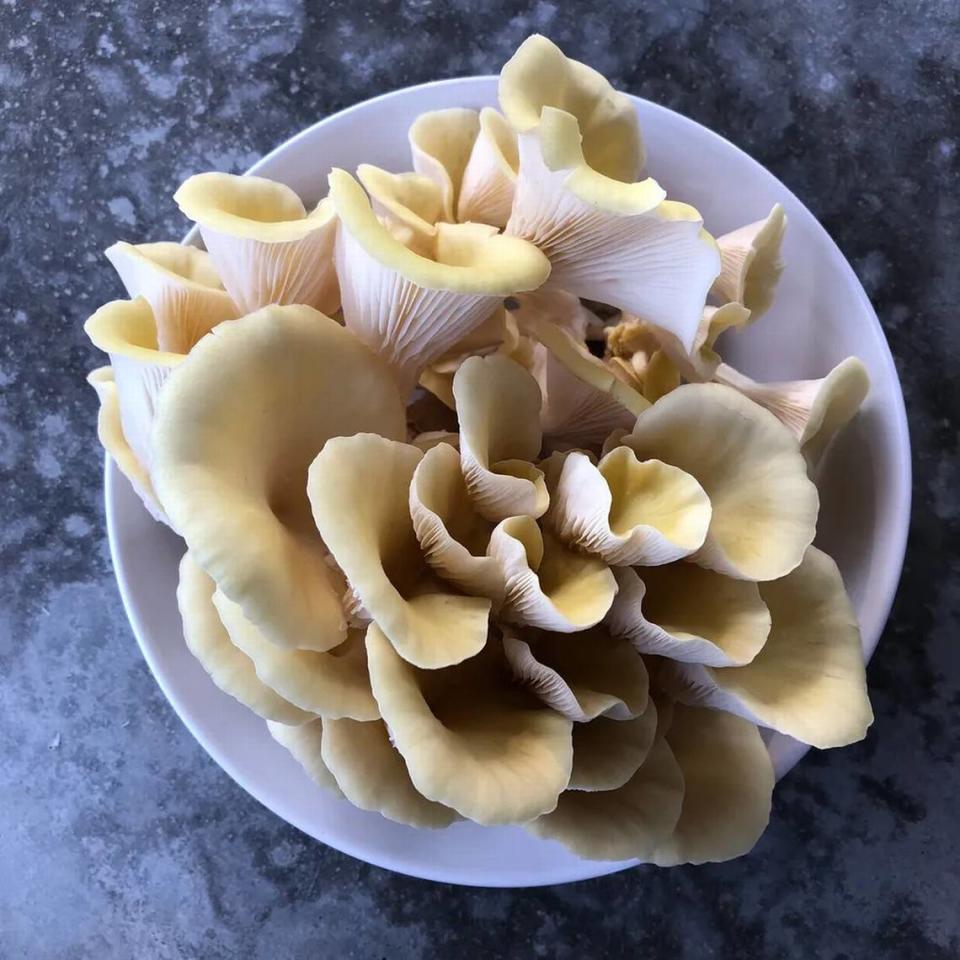
Since foraging for wild mushrooms can be seasonal and provide an erratic yield, the Batlle family dug into mushroom farming in 2019.
“We bought a beautiful little grow kit from Amazon, grew mushrooms and the kids were super stoked,” Chris Batlle said.
The Batlles now own Mighty Cap Mushrooms, which has expanded from their garage to a large, state-of-the art facility on five acres about two miles outside of Paso Robles.
They’ve gone from producing 10 pounds of fungi a week for themselves to about 700 pounds a week.
Batlles estimates that “a pound of blue oyster mushrooms might include 20 to 30 individual mushroom caps.”
“We recommend buying a quarter pound per serving as a side dish, half a pound for a main,” he said.
According to Batlles, Mighty Cap sells ‘shroom varieties including lion’s mane, oysters, chestnut, king trumpet, black pearl, maitake and shiitake at retail outlets such as Avocado Shack in Morro Bay, SLO Food Co-op in San Luis Obispo and Etto Pastifico pasta factory and market in Paso Robles.
Mike Wolfe, Avocado Shack’s owner, called Mighty Cap Mushrooms “the best I’ve ever seen.”
The Paso Robles company’s locally grown produce is “picked in the morning and delivered that afternoon,” he said. “That’s so much better for the nutritional value, and once the customer gets them home, the mushrooms will last a long time.”
Batlle said Mighty Cap’s main customer base is more than 100 restaurants, which fits tidily with his restaurant background.
“We sell out every day,” he said. “We can’t even build up a surplus.”
Mighty Cap also has a subscription service and takes reservations for mushroom farm facility tours.

Local Route Mushrooms, Los Osos
Katie and Zac Schlais, who own Local Route Mushrooms in Los Osos, believe fungi are helping their health.
Katie Schlais said her husband’s second hip surgery left him with “bruised nerves and long-term numbness.” Then he started eating lion’s mane mushrooms.
She and her husband are convinced that the ‘shrooms noticeably shortened his recovery time and healing, compared to his first surgical recuperation.
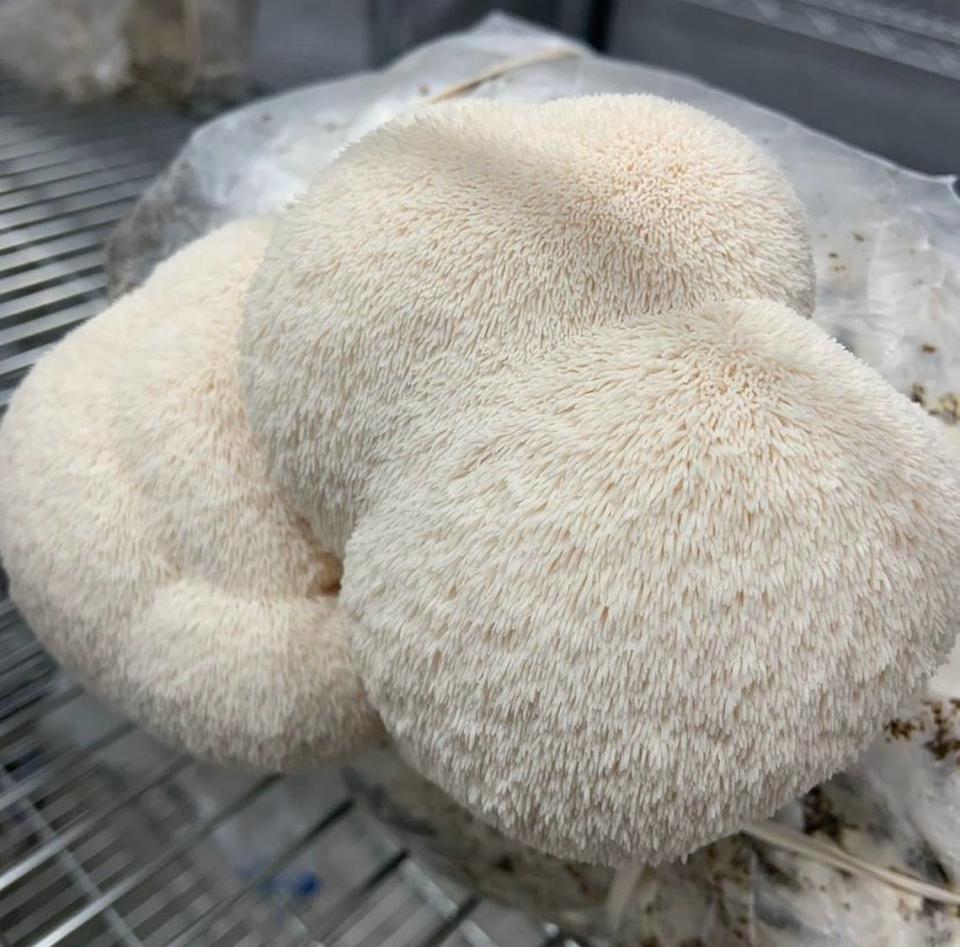
Katie Schlais adds that using a Local Route reishi mushroom tincture has reduced her husband’s once-monthly autoimmune flare-ups to one a year.
She has been diagnosed with Lynch syndrome, which “puts you at higher risk for certain cancers,” she said, “and since mushrooms have shown to help with tumor suppression and other anti-cancer elements, we just went all in” on eating, growing and selling mushrooms.
Local Route’s current crops are lion’s mane, oysters, king trumpets, chestnuts, black pearl kings, reishi and turkey tail, and the company is experimenting with other varieties.
Local Route sells its mushrooms at the Avila Beach farmers market and to some restaurants and chefs, and its tinctures on Etsy and at Plantae and Fungi shop in Cambria.
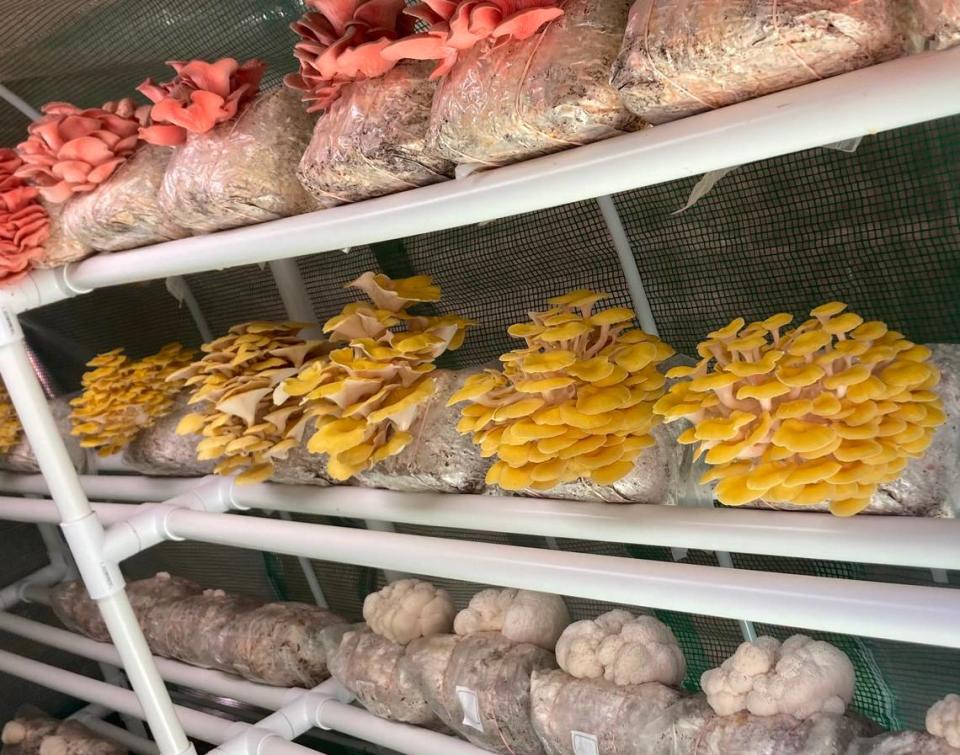
Werdless Farms, San Luis Obispo
Rachel Werderits and Bryan Loveless grow a dozen mushroom species on less than one-tenth acre at their urban San Luis Obispo farm, Werdless Farms.
The farm’s name is a mash-up of their surnames.
The married couple sells at three local farmers markets, held on Saturday morning in San Luis Obispo and Wednesday and Saturday afternoon in Arroyo Grande.
Werderits grew up in SLO County. She met Loveless, an avid hiker and mushroom forager, when both were working for the Maryland Park Service.
Loveless, a hiker, took Werderits “on several forays,” she said, “and the rest is history.”
The couple moved back to SLO County to be closer to her family, then started Werdless in 2021.
They began selling their fungi in June that year.
Among the mushroom species Werdless Farms offers regularly are oysters, lion’s mane, coraltooth, shiitake, chestnut and pioppino.
Maitake, a slow-growing species, isn’t a consistent offering for the farm. “But it’s one to keep an eye out for,” Werdless said, “because it’s quite the delicacy.”
Why grow mushrooms?
According to Perryman and other local growers, fungi can be fussy.
Mushrooms can take weeks to develop, are delicate and easily bruised, and have precise demands for water, airflow, temperature fluctuation, humidity and more.
Perryman said juggling all that to produce a sustainable, farm-to-table local crop is worth it, and her customers can tell the difference.
“The specialty mushroom industry is experiencing huge growth,” she said.
According to The Guardian, that market has grown 12 to 15% annually, compared to the domestic button mushroom market, which has an annual growth of 3 to 5%.
In an industry dominated by large corporate farms, “We are a small, local operation and intend to keep it that way,” Perryman said. “Our focus is to produce high quality, organically grown gourmet mushrooms for our local market and to educate people of the benefits of adding them to their diets.”
She hopes mushrooms don’t get so trendy that their popularity flares out.
Fungi is “such a long-term, diverse food source,” Perryman said,” with so many nutrients for so many people around the world. … The best part is what we are creating here is interdependence with our local community.”

